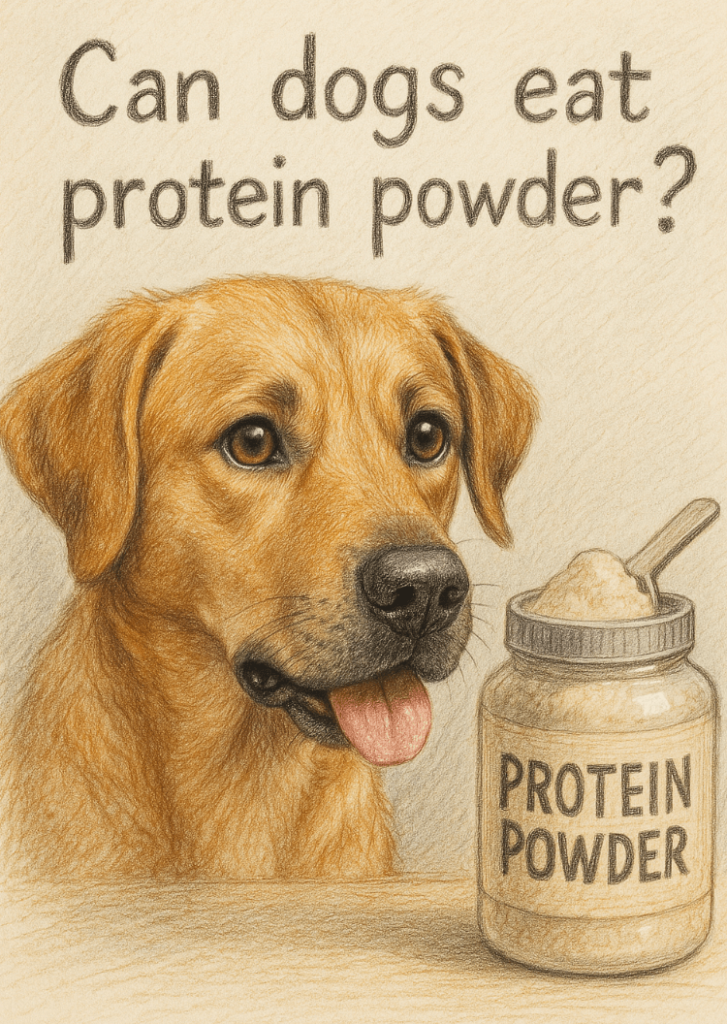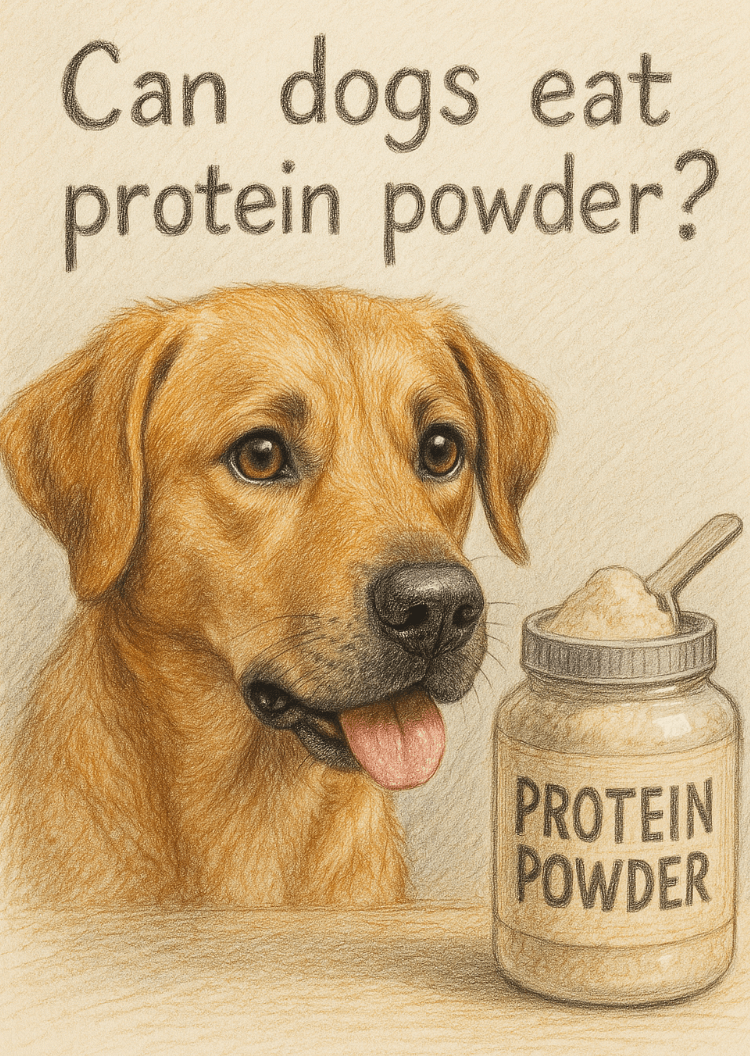Can Dogs Eat Protein Powder?
As pet owners become increasingly health-conscious, many are curious about whether human supplements like protein powder are safe for their canine companions. Protein is an essential nutrient for dogs, supporting muscle development, immune function, and overall vitality. However, not all protein powders are created equal, and some may pose risks to your dog’s health. Understanding which types of protein powder are safe—and which should be avoided—is crucial to ensuring your furry friend stays happy and healthy. In this blog post, we’ll explore everything you need to know about feeding protein powder to dogs, including potential benefits, risks, and safer alternatives.
Potential Risks of Feeding Protein Powder to Dogs
While protein is beneficial for dogs, certain types of protein powder can be harmful due to added ingredients or high concentrations of specific nutrients. Here are some risks to consider before offering protein powder to your pup.
Artificial Additives:
Many protein powders contain artificial sweeteners like xylitol, which is toxic to dogs and can cause severe health issues.High Calorie Content:
Protein powders are often calorie-dense, and overfeeding can lead to weight gain or obesity in dogs.Digestive Upset:
Some dogs may experience bloating, gas, or diarrhea when introduced to protein powder, especially if their digestive systems aren’t accustomed to it.Excessive Protein Intake:
Too much protein can strain a dog’s kidneys, particularly in older dogs or those with pre-existing health conditions.Allergic Reactions:
Certain protein sources, such as whey or soy, may trigger allergies or sensitivities in some dogs.
These risks highlight the importance of caution and consultation with a veterinarian before introducing protein powder into your dog’s diet.
Types of Protein Powders and Their Safety for Dogs
Not all protein powders are suitable for dogs, and understanding the differences between them is key to making safe choices. Here’s a breakdown of common protein powder types and their compatibility with canine diets.
Whey Protein:
Whey protein is derived from dairy and may cause digestive upset in lactose-intolerant dogs. It’s best avoided unless specifically recommended by a vet.Plant-Based Protein (e.g., Pea or Rice Protein):
Plant-based proteins are generally safer but should still be introduced gradually to monitor for adverse reactions.Collagen Protein:
Collagen is often considered safe for dogs and may support joint health, making it a popular choice for senior pets.Soy Protein:
Soy contains phytoestrogens that can disrupt hormone balance in dogs, so it’s best to avoid soy-based powders altogether.Egg White Protein:
Egg white protein is highly digestible and safe for most dogs, provided they don’t have egg allergies.
Choosing the right type of protein powder ensures your dog receives the benefits without unnecessary risks.
Check this guide 👉Can Dogs Eat Mulch? Best 7 Expert Tips!
Check this guide 👉Can Dogs Eat Agave? Best 7 Expert Tips!
Check this guide 👉Can Dogs Eat Gourds? Best 7 Expert Tips!

Safe Protein Sources for Dogs | Unsafe Ingredients to Avoid |
|---|---|
Collagen protein | Artificial sweeteners like xylitol |
Egg white protein | High-calorie additives |
Pea or rice protein | Soy protein |
Lean meat-based protein powders | Dairy-based proteins (for lactose-sensitive dogs) |
Fish-based protein (low in mercury) | Preservatives and fillers |
How to Safely Introduce Protein Powder to Your Dog’s Diet
If you decide to incorporate protein powder into your dog’s diet, it’s important to do so carefully and responsibly. Follow these steps to ensure a smooth transition.
Consult Your Veterinarian First:
Always seek professional advice to confirm that protein powder is appropriate for your dog’s specific needs.Start with Small Amounts:
Begin by mixing a tiny amount of protein powder into your dog’s regular food to gauge their tolerance.Monitor for Side Effects:
Watch for signs of digestive upset, allergic reactions, or changes in behavior after introducing the supplement.Choose Plain, Unsweetened Varieties:
Opt for protein powders free of artificial flavors, sweeteners, and unnecessary additives.Adjust Portions Based on Activity Level:
Active dogs may benefit from slightly higher protein intake, while sedentary dogs require less to avoid excess calories.
By following these guidelines, you can safely incorporate protein powder into your dog’s diet without compromising their health.
Signs Your Dog May Be Sensitive to Protein Powder
Even with careful introduction, some dogs may exhibit sensitivity or adverse reactions to protein powder. Recognizing these signs allows you to act promptly and protect your dog’s well-being.
Vomiting or Diarrhea:
Gastrointestinal distress is a common sign of intolerance to new supplements or ingredients.Itchy Skin or Hot Spots:
Allergic reactions often manifest as skin irritation, redness, or excessive scratching.Lethargy or Lack of Energy:
If your dog seems unusually tired or uninterested in activities, it could indicate an issue with the supplement.Swelling or Difficulty Breathing:
Severe allergic reactions, though rare, require immediate veterinary attention.Increased Thirst or Urination:
Excessive protein intake can strain the kidneys, leading to dehydration or frequent urination.
Being vigilant about these symptoms helps you identify and address potential problems early.
Common Mistakes to Avoid When Feeding Protein Powder to Dogs
Feeding protein powder to your dog requires careful consideration to avoid mistakes that could harm their health. Here are some pitfalls to watch out for.
Using Human Protein Powders Without Research:
Many human protein powders contain ingredients that are unsafe for dogs, such as xylitol or artificial flavors.Overfeeding Protein Powder:
Too much protein can overwhelm your dog’s system, leading to weight gain or kidney strain.Ignoring Pre-Existing Health Conditions:
Dogs with kidney disease or other health issues may not tolerate additional protein well.Skipping Veterinary Advice:
Failing to consult your vet increases the risk of introducing unsafe supplements into your dog’s diet.Mixing Protein Powder with Unsafe Foods:
Combining protein powder with foods like chocolate or grapes can create additional hazards for your dog.
Avoiding these mistakes ensures a safer and healthier experience for your dog.
Benefits of Natural Protein Sources Over Protein Powder
While protein powder can be convenient, natural protein sources often provide superior nutrition for dogs. Here’s why whole foods might be a better choice.
Complete Nutritional Profile:
Whole foods like chicken, beef, or fish offer vitamins, minerals, and fats alongside protein, supporting overall health.Easier Digestion:
Natural protein sources are typically gentler on a dog’s stomach compared to processed powders.No Artificial Additives:
Whole foods eliminate the risk of harmful ingredients like artificial sweeteners or preservatives.Cost-Effectiveness:
Cooking or preparing lean meats at home is often more affordable than purchasing specialty protein powders.Customizable Portions:
You can tailor portion sizes to meet your dog’s exact nutritional needs without worrying about hidden additives.
Natural protein sources provide a wholesome alternative to processed supplements.
Fun Ways to Boost Your Dog’s Protein Intake Naturally
If you’re looking to increase your dog’s protein intake without relying on protein powder, there are plenty of creative and enjoyable ways to do so.
Add Cooked Eggs:
Scrambled or boiled eggs are a tasty and nutritious way to boost protein while providing essential fatty acids.Incorporate Lean Meats:
Shredded chicken, turkey, or beef can be mixed into your dog’s meals for a protein-packed upgrade.Try Fish Occasionally:
Low-mercury fish like salmon or sardines offer omega-3 fatty acids along with protein for joint and coat health.Offer Cottage Cheese (if tolerated):
For dogs that aren’t lactose-sensitive, small amounts of cottage cheese provide protein and calcium.Use Pumpkin Puree as a Base:
Mixing pumpkin puree with lean meats creates a flavorful and nutritious meal enhancer.
These ideas allow you to enhance your dog’s diet naturally while keeping things interesting and delicious.
Frequently Asked Questions About Dogs and Protein Powder
Is protein powder necessary for dogs?
No, most dogs receive adequate protein from their regular diet. Protein powder should only be used under veterinary guidance.
Can puppies eat protein powder?
Puppies have unique nutritional needs; consult your vet before giving them any supplements, including protein powder.
What is the best type of protein powder for dogs?
Collagen or plain egg white protein is often recommended due to its digestibility and safety.
How much protein powder can I give my dog?
Dosage depends on your dog’s size, activity level, and dietary requirements—always follow your vet’s recommendations.
Are there natural alternatives to protein powder?
Yes, lean meats, eggs, and fish provide excellent protein sources without the need for supplements.
Prioritizing Your Dog’s Health When Considering Protein Powder
While protein powder can offer benefits for some dogs, it’s not a one-size-fits-all solution and must be approached with care. Understanding the potential risks, choosing appropriate protein sources, and consulting your veterinarian are essential steps to ensuring your dog’s safety and well-being. By focusing on balanced nutrition and monitoring your dog’s response to new supplements, you can provide the best possible care for your loyal companion. Remember, your dog relies on you to make smart dietary choices—so always prioritize their health above trends or convenience.
Do Cats Have Taste Buds? Best 7 Expert Tips! – Discover how cats experience flavors and why their taste is so unique.
Do Dogs Have Taste Buds? Best 7 Expert Tips! – Discover how dogs experience taste, their preferences, and what it means for their diet and health.
Can Cats Taste Sweet? Best 7 Expert Tips! – Discover why cats can’t taste sweetness, how it affects their diet, and tips to keep them healthy and happy.
Can Dogs Taste Sweet? Best 7 Expert Tips! – Discover how dogs perceive sweetness, which foods are safe, and tips to manage their sweet cravings responsibly.





